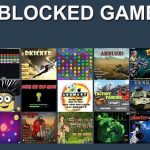The Benefits of Unblocked Games at School: Learning Through Play
In the world of education, the integration of technology and unconventional methods has been gaining momentum over the years. One such approach that has gained popularity is the use of unblocked games in schools. Traditionally, schools have been synonymous with structured learning, but the introduction of games that can be accessed during school hours has opened up new avenues for learning.
Unblocked games provide students with an opportunity to learn through play, fostering creativity, problem-solving skills, and enhancing their overall educational experience. In this article, we will delve into the benefits of unblocked games at school and how they contribute to a more dynamic and engaging learning environment.
Table of Contents
Unblocked games at school: Enhancing Critical Thinking and Problem-Solving
Unblocked games often present challenges and puzzles that require critical thinking and problem-solving skills to overcome. Students are encouraged to think on their feet, strategize, and make decisions quickly. Games like Sudoku, chess, and logic puzzles stimulate the mind, fostering analytical thinking and improving the ability to solve complex problems. As students face new challenges within the game, they learn to adapt, experiment with different strategies, and persevere through setbacks, which are essential life skills.
Promoting Creativity and Imagination
Many unblocked games are designed with creativity and imagination in mind. Games such as Minecraft allow students to construct and explore virtual worlds, using their creativity to build structures and solve problems. This not only engages their imagination but also promotes innovative thinking. The ability to create, experiment, and adapt within the game world can carry over to their academic endeavors and future careers.
Encouraging Collaboration and Social Skills
Several unblocked games are multiplayer, requiring students to collaborate with their peers. This fosters teamwork and the development of social skills as they communicate and work together to achieve a common goal. In games like Fortnite or Minecraft, students can form teams and coordinate strategies, which enhances their ability to work effectively with others. These collaborative experiences can translate to better group work in the classroom and, later on, in the professional world.
Reducing Stress and Enhancing Focus
While the academic environment can sometimes be stressful, unblocked games offer a brief escape for students. Playing games can provide a healthy outlet for stress and frustration, allowing students to relax and recharge. This, in turn, can improve their focus and productivity when they return to their studies. The short breaks between lessons, filled with a bit of gaming, can help students manage their stress levels effectively.
Boosting Learning Motivation
Unblocked games, when used judiciously, can serve as a powerful motivational tool for students. By incorporating gaming elements into the learning process, educators can make lessons more engaging and enjoyable. Gamified educational apps and platforms can make challenging subjects more approachable, encouraging students to invest more time and effort into their studies.
Enhancing Digital Literacy
In the digital age, having strong digital literacy skills is crucial. Unblocked games expose students to various digital interfaces and technologies, helping them become more tech-savvy. This exposure can be valuable for their future academic and professional pursuits, as many careers require a solid foundation in digital skills.
Providing Immediate Feedback
Many unblocked educational games offer instant feedback, allowing students to understand their mistakes and learn from them in real-time. This immediate feedback can be a powerful tool for enhancing the learning process, as students can correct their errors and improve their skills on the spot.
Encouraging Healthy Competition
Unblocked games can foster a sense of healthy competition among students. Competing against peers or the game itself can motivate students to strive for excellence and work harder to achieve their goals. This competitive spirit can be beneficial in various aspects of life, including academics and future careers.
Customizing Learning Paths
Many unblocked games offer the option to customize the difficulty level, allowing students to tailor their gaming experience to their skill level. This customization can help each student learn at their own pace and address their specific educational needs.
Reinforcing Learning Objectives
Some unblocked games are explicitly designed to reinforce specific learning objectives, such as math, language, or science. These games align with the curriculum and provide an enjoyable way to review and practice what students have learned in the classroom.
Supporting Different Learning Styles
Every student has a unique learning style. Some are visual learners, while others are auditory or kinesthetic learners. Unblocked games offer a multi-modal approach to education, catering to various learning styles. Visual learners can benefit from the graphics and interactive elements in games, auditory learners can engage with in-game sounds and music, and kinesthetic learners can use the tactile nature of gaming to reinforce their understanding of concepts.
Developing Spatial Awareness and Coordination
Many games, especially action and simulation games, require a high degree of spatial awareness and hand-eye coordination. These skills can be vital in various real-world scenarios. For instance, surgeons, architects, and even sports professionals can benefit from enhanced spatial awareness and coordination developed through gaming.
Teaching Time Management
Unblocked games can teach students the importance of time management. Since they often have a limited amount of time to complete tasks or reach goals within a game, students learn to prioritize tasks effectively, manage their time, and make decisions under time constraints. These skills are invaluable as students progress in their academic careers and later in their professional lives.
Cultivating a Growth Mindset
The challenges presented in unblocked games can promote a growth mindset in students. Rather than viewing failure as a setback, students learn to see it as an opportunity for growth. They understand that repeated efforts and learning from mistakes can lead to success. This growth mindset can be transferred to their approach to academics, where they will be more open to challenges and view setbacks as opportunities for improvement.
Encouraging Self-Directed Learning
Unblocked games often allow students to explore and learn independently. They can choose which games they want to play and explore the content at their own pace. This self-directed approach to learning encourages students to take initiative and responsibility for their education, helping them become lifelong learners.
Fostering Digital Citizenship
In an era where online safety and digital citizenship are critical, unblocked games can serve as a platform to teach responsible internet use. Students learn to navigate online spaces safely, understand the importance of respectful online behavior, and develop awareness of potential online risks.
Bridging Generational Gaps
Games can provide a unique opportunity for teachers and parents to connect with students. By showing an interest in the games their children play, educators and parents can bridge generational gaps and engage in meaningful conversations about the educational and entertainment aspects of gaming.
Preparing for Future Careers
The gaming industry is one of the fastest-growing sectors, offering numerous career opportunities in game development, design, marketing, and more. Unblocked games can inspire students to explore potential career paths within the industry and develop relevant skills.
Tips about Unblocked Games at School:
- Set Clear Guidelines: While unblocked games have numerous advantages, it’s essential to establish clear guidelines on when and how they can be used in the classroom. This prevents distractions and ensures that they are used as educational tools.
- Use Educational Game Portals: There are various educational game portals and platforms designed specifically for classroom use. These platforms offer a selection of games that align with curriculum objectives and provide a controlled environment for learning through play.
- Regularly Assess Progress: Monitor and assess how unblocked games are impacting students’ learning outcomes. Gather feedback from both students and teachers to make informed decisions about which games are most effective and how to improve the learning experience.
- Diversify Game Types: Offer a variety of game types to cater to different interests and learning styles. Puzzle games, simulation games, strategy games, and quizzes can all be valuable for different subjects and learning goals.
- Encourage Student Input: Involve students in the selection of educational games. This not only gives them a sense of ownership over their learning but also helps educators discover games that resonate with their students’ interests.
Facts about Unblocked Games at School:
- Early Educational Games: Educational games have been used in classrooms for decades. One of the earliest examples is “The Oregon Trail,” a game that taught students about American pioneer life and history. It was first developed in the 1970s and is still used in some schools today.
- The Rise of Gamification: Gamification, or the use of game elements in non-gaming contexts, is a growing trend in education. Teachers use game mechanics like points, badges, and leaderboards to make learning more engaging.
- Global Impact: Unblocked games in education aren’t limited to a specific region. Schools worldwide are incorporating games into their teaching methods, demonstrating the global recognition of the benefits of game-based learning.
- Impact on Academic Performance: Research has shown that educational games can improve academic performance. A study published in the journal “Educational Technology Research and Development” found that students who used educational games scored higher on standardized tests than those who didn’t.
- Educational Game Design: The field of educational game design has grown substantially. Experts in game development, psychology, and education collaborate to create games that effectively convey educational content while maintaining an enjoyable gaming experience.
- Adaptive Learning: Some educational games use adaptive learning algorithms to adjust the difficulty of the game based on the student’s performance. This ensures that the content remains challenging but not frustrating.
- Cross-Curricular Integration: Educational games can be used to teach a wide range of subjects, from mathematics and science to history and languages. This makes them a versatile tool for educators in various disciplines.
- Accessibility and Inclusivity: Many educational games are designed to be accessible to students with disabilities. This inclusivity ensures that all students can participate in the learning process through gaming.
Conclusion
Unblocked games at school are more than just a fun diversion; they offer a myriad of benefits that contribute to a more dynamic and engaging learning environment. By enhancing critical thinking, promoting creativity, encouraging collaboration, reducing stress, and providing immediate feedback, unblocked games contribute to a holistic approach to education. As educators continue to explore the potential of unblocked games in the classroom, they open up new avenues for students to learn through play and prepare for the challenges of the 21st century. When used in moderation and with clear learning objectives in mind, unblocked games can be a valuable addition to the educational toolkit.








